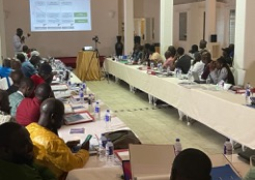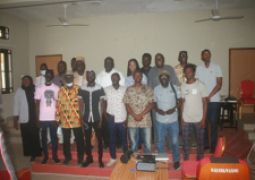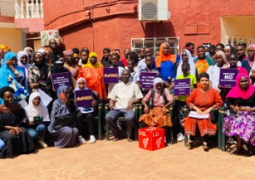
The Gambia’s banking industry on Saturday staged one of its most significant gatherings in recent history as the Gambia Bankers Association hosted its 6th Annual Bankers Dinner and Awards Night at the Sir Dawda Kairaba Jawara International Conference Center.
The 2025 edition, held under the theme “Driving Economic Empowerment Through Financial Intermediation,” brought into sharp focus the expanding footprint of the financial sector, its growing contribution to national development and the strategic direction shaping the future of banking in the country.
 The ceremony was attended by senior government officials, regulators, development partners, commercial bank executives and representatives of regional banking institutions. President Adama Barrow, the Chief Guest of Honour, was represented by Vice President Muhammed BS Jallow.
The ceremony was attended by senior government officials, regulators, development partners, commercial bank executives and representatives of regional banking institutions. President Adama Barrow, the Chief Guest of Honour, was represented by Vice President Muhammed BS Jallow.
The event also marked the 23rd anniversary of the establishment of the Gambia Bankers Association, an institution formed at a time when the country had only five commercial banks. Today, the industry has grown into one of the most influential sectors of the national economy, with eleven commercial banks, a rapidly expanding customer base and a deepening role in financial inclusion, fiscal stability and national development.
A series of awards were presented to distinguished personalities including President Adama Barrow, former Vista Bank Managing Director Binta Janneh, former Executive Secretary of the Gambia Bankers Association and current Secretary General of the West African Bankers Association Alagie Jeng, as well as several senior practitioners who have contributed significantly to the growth and modernization of the banking sector.
The awards were given in recognition of leadership, innovation, integrity and long-standing service to the financial industry. According to the Association, the honourees were selected through a rigorous evaluation of impact, service delivery and contribution to sectoral development.
In his keynote remarks, Executive Secretary of the Gambia Bankers Association Pa Alieu Ndow said the annual dinner is more than a celebration. He described it as an important moment for the entire financial ecosystem to renew its commitment to excellence, industry motivation and national development priorities.
Ndow announced that Gambian banks continue to stand in a strong position, supported by resilient systems, improved governance, expanding digital infrastructure and a growing pool of banking professionals. He said the Association will intensify stakeholder engagement, strengthen dialogue with regulators, enhance capacity building for banks and promote stronger customer protection mechanisms.
He urged institutions to remain mindful of their collective responsibility to shape a financial sector that works for every Gambian and added that the years ahead will require banks to collaborate more effectively, innovate faster and serve customers with renewed dedication.
Presenting an extensive review of the sector, President of the Gambia Bankers Association Isatou Jawara said the banking industry has undergone a remarkable transformation over the past two decades and especially in the years following the global COVID 19 pandemic. She said the Gambia’s banking sector not only demonstrated resilience during the economic shocks but emerged stronger and more technologically advanced.
According to figures shared during the ceremony, total industry loans increased from D7.34 billion in 2020 to D17.51 billion as of September 2025, representing growth of more than 137 percent. Total deposits rose from D42.65 billion to D77.64 billion during the same period, an 82 percent increase.
Jawara said the sector currently serves over 929,000 customers across eleven commercial banks and operates 148 automated teller machines, including the first dual purpose machine capable of both depositing and withdrawing cash. She said the expansion of digital platforms has improved convenience, strengthened financial inclusion and widened access to services for Gambians in both urban and rural areas.
She added that the banking sector has contributed significantly to job creation, employing more than 3,000 Gambians. The sector also supports small and medium-sized enterprises which she identified as vital drivers of economic empowerment and national development.
Jawara highlighted the work of the Institute of Bankers, the Association’s training subsidiary, which provides certification, continuing professional development and capacity building programmes for banking professionals. She said the institute is playing an essential role in strengthening competence and professionalism across the industry.
A major success, she added, was the smooth and efficient takeover of one commercial bank by another during the year, a process completed without service disruptions and executed with strong regulatory oversight.
Secretary General of the West African Bankers Association and former GBA Executive Secretary Alagie Jeng delivered a goodwill statement, describing the 2025 theme as timely and aligned with regional priorities. WABA currently coordinates 245 commercial banks across West Africa, including 105 within the WAMZ zone and 140 in the UEMOA zone.
Jeng emphasised the need for accelerated innovation, adoption of fintech solutions, improved regulatory policies and deeper cross border collaboration. He said the future of West African banking depends on the ability of banks to adapt to emerging technologies, strengthen financial resilience and promote inclusive growth within the sub-region.
He described the Gambia Bankers Association’s 23 year journey as a story of resilience and expansion and commended the GBA for its consistent contribution to national and regional banking development.
Speaking on behalf of the Governor of the Central Bank, Deputy Governor Dr Paul Mendy called on banks to deepen investments in digital systems and strengthen integration with national and regional payment platforms including Gamswitch, the Real Time Gross Settlement System, the Automated Clearing House and mobile money and fintech networks.
He said these platforms form the backbone of the digital economy and that secure interconnectivity would enhance confidence, accelerate financial inclusion and reduce operational risk. Dr Mendy noted that the sector continues to show growth in assets, deposits, credit and service innovation.
He said progress in operationalizing the national capital market has reached advanced stage and that the trading software is expected to be rolled out soon. He encouraged banks to continue designing products that serve the needs of women, youth and small and medium sized enterprises.
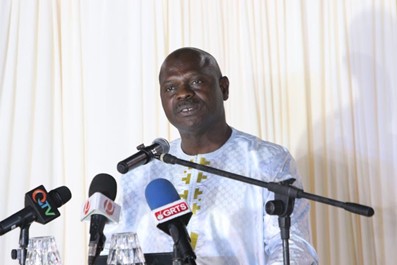 Minister of Finance and Economic Affairs Seedy Keita delivered the keynote policy address and said financial intermediation remains central to economic growth, social empowerment and the country’s development agenda under the 2023 to 2027 national development plan.
Minister of Finance and Economic Affairs Seedy Keita delivered the keynote policy address and said financial intermediation remains central to economic growth, social empowerment and the country’s development agenda under the 2023 to 2027 national development plan.
He urged banks to improve their loan to deposit ratios which he said remain low within the region and challenged financial institutions to deploy their mobilizing power not only to accumulate deposits but to provide critical capital for the productive sectors. He called attention to the recently launched capital market and encouraged banks to issue fixed income securities that will deepen private sector financing and stimulate economic activity.
Keita said the private sector is the engine of economic growth and that banks must play a more active role in unlocking opportunities that support enterprise development and job creation.
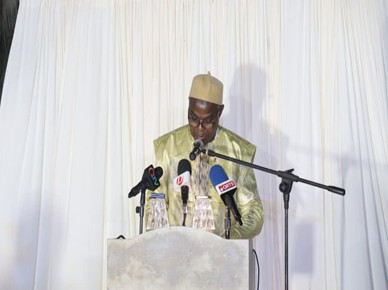 Delivering the President’s address, Vice President Muhammed BS Jallow said the Gambia has made progress in building a stable economic environment due to the government’s commitment to peace, security and democratic governance. He said these conditions have enabled businesses to invest confidently and allowed the banking sector to expand significantly.
Delivering the President’s address, Vice President Muhammed BS Jallow said the Gambia has made progress in building a stable economic environment due to the government’s commitment to peace, security and democratic governance. He said these conditions have enabled businesses to invest confidently and allowed the banking sector to expand significantly.
The Vice President said banks have supported key areas including agriculture, trade, tourism, manufacturing, energy and infrastructure through credit expansion, digital innovation and strong partnerships. He urged managing directors to intensify collaboration with small and medium sized enterprises to expand job creation, financial literacy and entrepreneurship nationwide.
He added that the modern payment ecosystem now allows seamless transfers and payments across institutions in real time and that this achievement aligns with the government’s Digital Gambia agenda and efforts to strengthen the country’s global financial reputation.
 The 6th Annual Bankers Dinner and Awards Night concluded with the presentation of awards to institutions and individuals recognized for their contributions to sectoral excellence. This year’s event highlighted the stability of the country’s financial system, the expanding role of digital platforms, the sector’s growing contribution to national revenue and employment and the collective commitment to building a financial system that supports inclusive and sustainable economic growth.
The 6th Annual Bankers Dinner and Awards Night concluded with the presentation of awards to institutions and individuals recognized for their contributions to sectoral excellence. This year’s event highlighted the stability of the country’s financial system, the expanding role of digital platforms, the sector’s growing contribution to national revenue and employment and the collective commitment to building a financial system that supports inclusive and sustainable economic growth.
The Gambia Bankers Association reaffirmed its commitment to working with government, regulators and development partners to deepen financial inclusion, strengthen economic diversification and drive national development through expanded financial intermediation.


